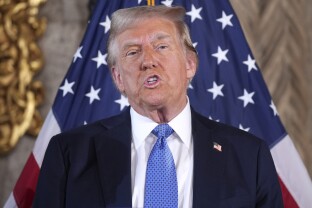In an unexpected memo from Donald Trump’s budget office Monday night, the new administration is ordering a “temporary pause” on “all federal financial assistance” with the exception of Medicare and Social Security payments.
A two-page document released internally late Monday night — and effective on Tuesday at 5 p.m. — orders all federal agencies to “temporarily pause” assistance programs. The memo, authored by the acting director of the Office of Management and Budget, Matthew Vaeth, explicitly names aid “including, but not limited to, foreign aid, nongovernmental organizations, [diversity, equity and inclusion], woke gender ideology, and the green new deal.”
Although the memo carves out Medicare and Social Security in a footnote, and says the freeze will not impact any assistance “provided directly to individuals,” it wasn’t immediately clear what other aid programs may be affected.
The list of programs that could be touched by the order is vast: Medicaid, disaster relief, farm aid, student loan programs, Head Start, highway funds, nutrition assistance, rent assistance and dozens of other programs.
“Financial assistance should be dedicated to advancing Administration priorities, focusing taxpayer dollars to advance a stronger and safer America, eliminating the financial burden of inflation for citizens, unleashing American energy and manufacturing, ending ‘wokeness’ and the weaponization of government, promoting efficiency in government, and Making America Healthy Again,” the memo reads.
The memo asks agencies to submit “detailed information” about the programs subject to the aid freeze, saying OMB would review the programs and provide future guidance.
The effects could be severe depending on how long the freeze lasts, particularly for low-income Americans. Many major assistance programs, like Head Start and Section 8 housing subsidies for low-income families, operate as federal grants to the states. Even a temporary pause on payments could have dire effects for those programs and those who benefit from them.
In 2022, federal dollars were the second-largest source of revenue for states — only behind taxes — with federal grants accounting for $1.1 trillion of state revenue, according to the Pew Charitable Trusts. That’s about a third of what states collected in total.
“If the federal government doesn’t uphold its end of the deal, then states are put in this difficult situation where they are put in the red, because all of the sudden they don’t have the federal funding they are supposed to have,” Bobby Kogan, a federal budget expert at the left-leaning Center for American Progress, told NOTUS. “This means that some of them are either going to have to eat the cost or shutter them.”
“We are literally talking about people being kicked out of their homes in the middle of winter,” Kogan added.
Democrats on Capitol Hill were quick to lambast the order, with the top Democratic appropriators in the House and Senate — Rep. Rosa DeLauro and Sen. Patty Murray — writing in a joint letter Monday night that “the scope of what you are ordering is breathtaking, unprecedented, and will have devastating consequences across the country.”
“We write today to urge you in the strongest possible terms to uphold the law and the Constitution,” their letter says.
DeLauro and Murray also called into question OMB’s authority to issue such a sweeping order, noting that the Trump administration is effectively asking agencies to disregard the law.
“The law is the law — and we demand you in your role as Acting OMB Director reverse course to ensure requirements enacted into law are faithfully met and the nation’s spending laws are implemented as intended,” they said.
Senate Minority Leader Chuck Schumer also said in a statement that while the Trump administration says the freeze is temporary, “no one should believe that.”
“Donald Trump must direct his administration to reverse course immediately and the taxpayers’ money should be distributed to the people,” Schumer said.
In his first week in office, Trump already issued an executive order to claw back funds that Congress already appropriated, potentially violating the Congressional Budget and Impoundment Control Act of 1974, which prevents the president from rescinding money that Congress previously approved.
—
Matt Fuller is Capitol Hill bureau chief at NOTUS. Tara Golshan is a senior editor at NOTUS.
Correction: A previous version of this article misstated the source of Pew Charitable Trusts’ analysis of federal funds.
Sign in
Log into your free account with your email. Don’t have one?
Check your email for a one-time code.
We sent a 4-digit code to . Enter the pin to confirm your account.
New code will be available in 1:00
Let’s try this again.
We encountered an error with the passcode sent to . Please reenter your email.


